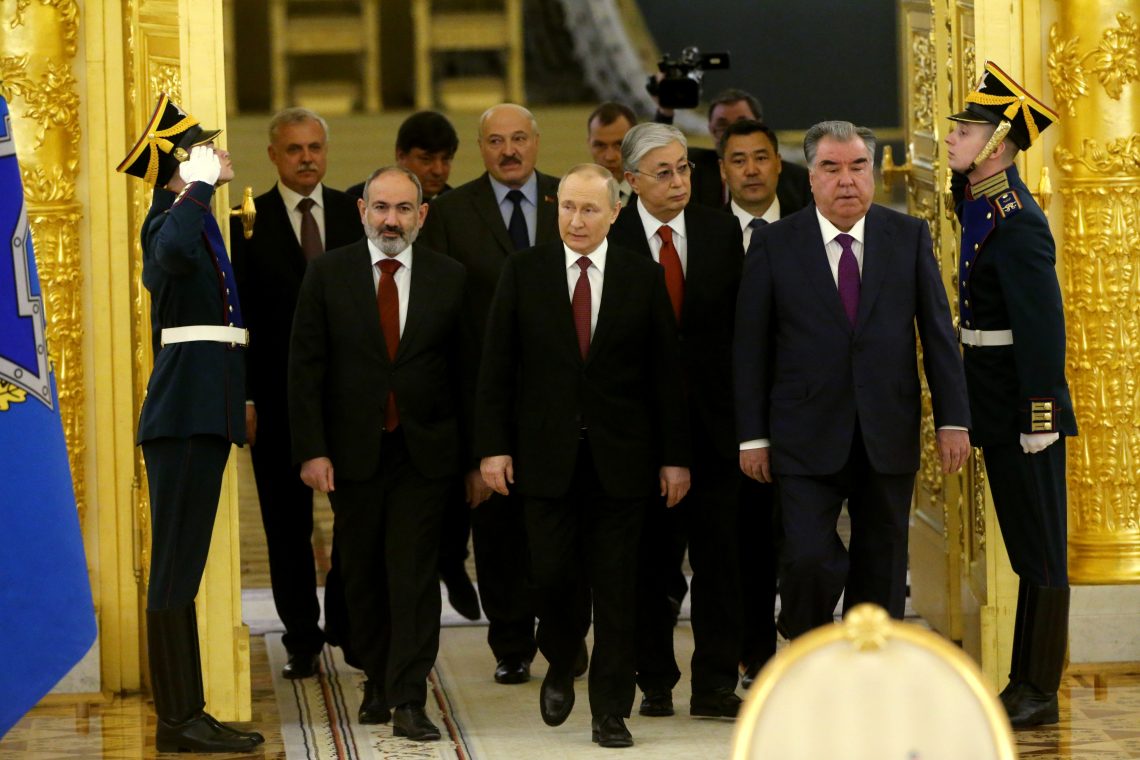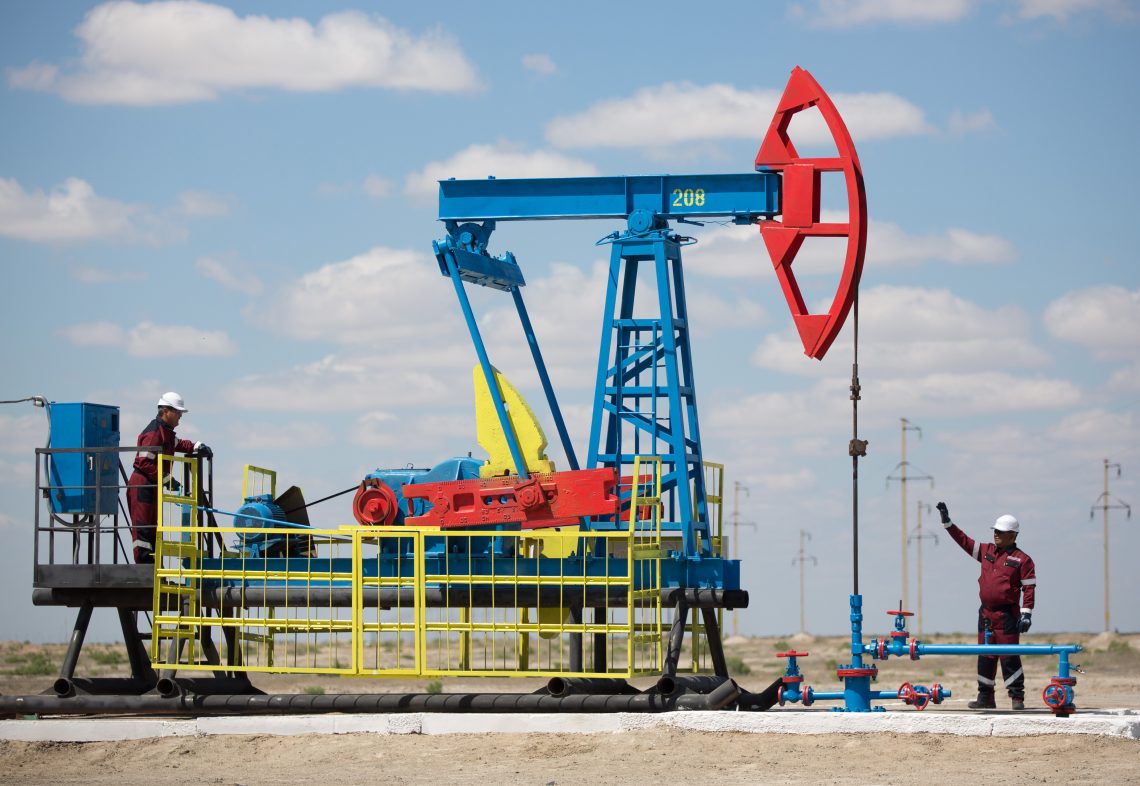Kazakhstan gives Russia the cold shoulder
The outcome of the war in Ukraine will shape the Kremlin’s sway over all the states it considers part of “historic Russia.”

In a nutshell
- Nur-Sultan has taken a pragmatic approach to the war
- Moscow is keen to strengthen its influence on former Soviet states
- Victory for Ukraine would give Kazakhstan more independence from Russia
The St. Petersburg International Economic Forum (SPIEF) has long been Russia’s version of the World Economic Forum at Davos. Held annually in June, it has offered Russian President Vladimir Putin an important stage for advancing his agenda.
This year, it was different. In his opening speech, Mr. Putin lauded Russia’s resilience and launched a scathing assault on the West, branding the United States a “fading world power.” While some hardline members of the Russian elite may have found this message encouraging, there were also reasons for concern.
One was that attendance by foreign dignitaries was sparse, with pride of place falling to the Taliban by default. Egyptian President Abdel-Fattah El-Sisi participated via video link, and Chinese President Xi Jinping sent a video message. The Russian oligarchs present also appeared uneasy. Even if key nations have refused to join the West in sanctioning Russia, their enthusiasm for actually providing tangible support has been tepid.
The most important takeaway from the SPIEF was the appearance of Kazakh President Kassym-Jomart Tokayev. While on stage together with Mr. Putin, he had the audacity to proclaim that he had no intention of recognizing any Russia-sponsored “quasi-state formations” in Ukraine. Upping the ante, he also took a shot at Russian Duma members who had questioned Kazakhstan’s independence.
President Putin appeared furious, responding with an insult combined with a chilling threat. Pretending to forget the name of the Kazakh leader, he claimed that all former USSR territories belong to Russia by right: “What is the Soviet Union? This is historic Russia. … You are part of historic Russia.”
Breaking with Moscow
Kazakhstan had made no secret of its attitude to Russia’s aggression against Ukraine. At the outset of the invasion, Nur-Sultan declared it would not contribute troops nor support the Kremlin’s recognition of the already-occupied territories in eastern Ukraine, the Luhansk and Donetsk People’s Republics. At a meeting in Brussels in late March, the Kazakh president’s deputy chief of staff, Timur Suleimenov, noted that “Russia wants us to support them, but we don’t recognize Crimea, or Donbas. Yes, we are in a union with Russia, but it doesn’t apply to this situation.”
On the eve of the SPIEF, Mr. Tokayev told the Russia-24 TV channel that his country had no intention of breaking Western sanctions: “We cannot violate them, especially because we receive warnings about possible so-called secondary sanctions against our economy from the West.” What must have really angered Mr. Putin was not the substance of the matter, but the sheer brazenness of Kazakhstan’s disloyalty.
Since the collapse of the USSR, Kazakhstan has been Russia’s closest ally, a founding member of the Eurasian Economic Union (EEU) and the Collective Security Treaty Organization (CSTO). When President Tokayev took the floor at the SPIEF, the audience would have also remembered how Russian and CSTO forces intervened to help the Kazakh government put down a violent rebellion this past January.
A Russian defeat would give Kazakhstan room to chart an increasingly independent course.
In his speech, Mr. Tokayev played down this intervention. He said there were people in Russia who “misrepresent the whole situation,” by claiming that Russia had somehow “saved” Kazakhstan and that the latter must now forever “serve and bow at the feet” of Russia. The insult was aggravated when it was revealed that he had declined to accept the prestigious Russian Order of Alexander Nevsky.
Kazakhstan’s decision to steer clear of Russia and honor the international sanctions regime is pragmatic. It avoids the risk of secondary sanctions from the U.S., and will help attract investment from companies, both foreign and domestic, relocating out of Russia. It will also play well with the Kazakh population, most of whom are sympathetic to the plight of Ukraine. It is, however, also a game of very high stakes.
The reaction from the Kremlin was swift. Kazakhstan’s massive oil exports are heavily dependent on the Caspian Pipeline Consortium (CPC), which transports oil across southern Russia to the Black Sea port at Novorossiysk. That flow will now be halted, ostensibly because some 50 World War II-era mines were found on the seabed and must be dealt with.
Yet, in a sign that its fear of the Kremlin has waned, Nur-Sultan responded by announcing it would block 1,700 railcars on its territory bearing Russian coal. Appearing at the Qatar Economic Forum on June 21, President Tokayev persisted in his open criticism of Russian aggression in Ukraine, saying that the “territorial integrity of countries should prevail.”
A Ukrainian victory
The future of this standoff will hinge on how the war in Ukraine develops. In a scenario where Russia suffers a decisive military defeat, and where sanctions remain in place until its military-industrial complex has been seriously degraded, there will be ample room for Kazakhstan to chart an increasingly independent course.
By reducing its dependence on the CPC pipeline, Nur-Sultan can deprive Moscow of transit revenue and undercut its political leverage. An immediate way of doing so would be to upgrade an existing pipeline to China. A more ambitious, longer-term project would be to create infrastructure to send Kazakh oil and gas to Azerbaijan, where it can be fed into existing pipeline networks running via Georgia to Turkey and onwards to Europe.
Another development relates to China’s Belt and Road Initiative (BRI), which has a northern route that runs from the Chinese border through Kazakhstan, Russia and Belarus and into the European Union. Benefiting from the open borders of the Eurasian Economic Union, this has been an important route for Chinese goods into Europe. As noted by Paul Stronski of the Carnegie Endowment for International Peace, this route is now dead.

The slack is being picked up by the Trans-Caspian International Transport Route (TITR) that runs from the Chinese border to key Kazakh ports on the Caspian Sea, where goods then flow to Russia, Azerbaijan and Iran. Also known as the Middle Corridor, this route will be substantially expanded. According to the head of the Aktau Sea commercial port, Abai Turikpenbayev, the TITR’s volume is set to increase sixfold this year.
Given that the flow via Azerbaijan will continue to Turkey and Europe, shifting the BRI’s emphasis from Russia toward the south will enhance links between Kazakhstan and Turkey. Though a gradual shift, it will allow Turkey to strengthen its position in Central Asia, much as it has already challenged Russia for influence in the Caucasus by supporting Azerbaijan in its war against Armenia. It is also noteworthy that the EU recently signed a deal with Azerbaijan to double gas imports by 2027.
Putin’s revenge
If, on the other hand, Russia does manage to extricate itself from the “special military operation” in Ukraine without suffering a major military defeat, and if sanctions are gradually lifted so that business with European partners can resume, there is little doubt that Mr. Putin will remember those who have failed to stand by his side. And he is known to be extremely vengeful.
Much as Ukraine fears that a premature cease-fire and peace agreement will be used by Russia to rebuild its forces before a renewed offensive, Kazakhstan has reason to worry that an embittered Russia will take steps to reduce its sovereignty and even its territorial integrity.
The critique that Mr. Tokayev aimed at members of the Russian Duma in St. Petersburg reflected a long-standing practice in Russian nationalist circles to question the legitimacy of the Kazakh border. When Stalin created Kazakhstan as a Soviet republic, the border with Russia was deliberately drawn so far north that the population would include a large share of Russian speakers; this remains the case. From the Kremlin’s perspective, the northern part of Kazakhstan is thus analogous to Donbas in Ukraine.
There is little doubt that Mr. Putin will remember those who have not stood by his side.
When President Putin claims that statehood for Ukraine is a mere fiction, Kazakhs remember a series of similar remarks made by Russian nationalists about their country. In one recent example, when Nur-Sultan announced it would not be holding a military parade on May 9, the Kremlin’s sacrosanct Victory Day, the anger in Russia was immediate. Prominent television talk show host Tigran Keosayan lashed out, calling Kazakhstan ungrateful and recommending that it should “look at Ukraine carefully, think seriously.”
Following Mr. Tokayev’s provocative appearance at the SPIEF, Russian social media was seething with outrage. The deputy chairman of the Duma committee on Commonwealth of Independent States affairs, Konstantin Zatulin, issued a thinly veiled threat – vowing that, in reference to the Russian-speaking minority in Kazakhstan, all options are on the table.
Scenarios
If outside support for Ukraine remains robust and Russia does suffer a military defeat, even without being ejected from all Ukrainian territories, then such threats may be dismissed as hot air. Kazakhstan will then not be alone in taking steps to weaken Russia’s influence and military presence. Azerbaijan is already siding with Ukraine; Moldova is bound to follow, and there will be incentives for other Central Asian states to follow Kazakhstan’s lead.
A harbinger was provided at the recent Caspian summit, held in Ashgabat, Turkmenistan. Upon arrival, all visiting heads of state were greeted with bread and salt, bar one – Vladimir Putin had to limp alone from his aircraft to his waiting security car.
The implication is that the outcome of the war in Ukraine concerns more than Ukraine: at stake is the Kremlin’s grip over all states it considers to be part of “historic Russia.” If it wins a significant strategic victory in Ukraine, and is able to start rebuilding its military power, then those states will meet greater risks, and NATO will face a serious long-term adversary.
Although countries like Germany may waver, facing the prospect of a winter without Russian gas, the likely outcome is that the main Western powers will stay the course. And, if deliveries of heavy weapons continue to increase, Ukrainian forces become more likely to liberate Russian-occupied territories. A recapture of the southern coastline would be especially humiliating for Moscow, even if Crimea is not won.
Although Mr. Putin will still find a way to claim victory, a successful Ukrainian counteroffensive would represent a strategic defeat that will inspire other countries to take a more determined stance. But the endgame is still remote, and a positive outcome for Kyiv remains vulnerable to a possible “Ukraine fatigue” in the West.







